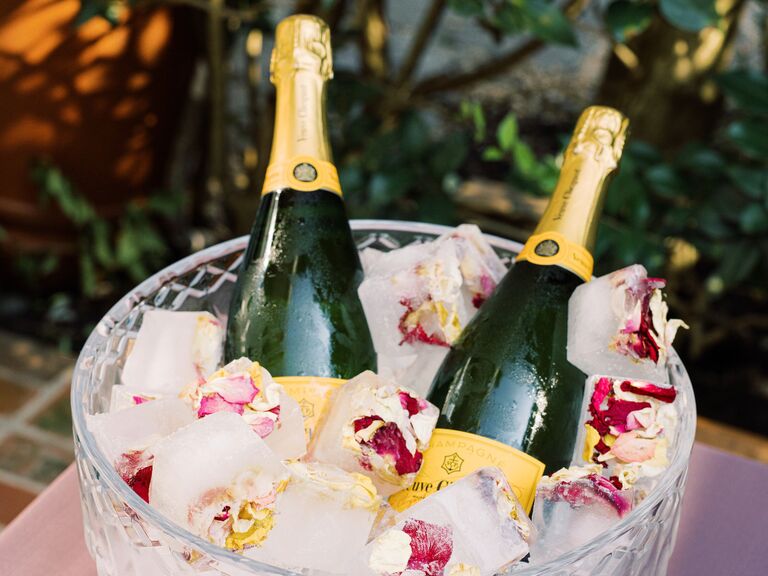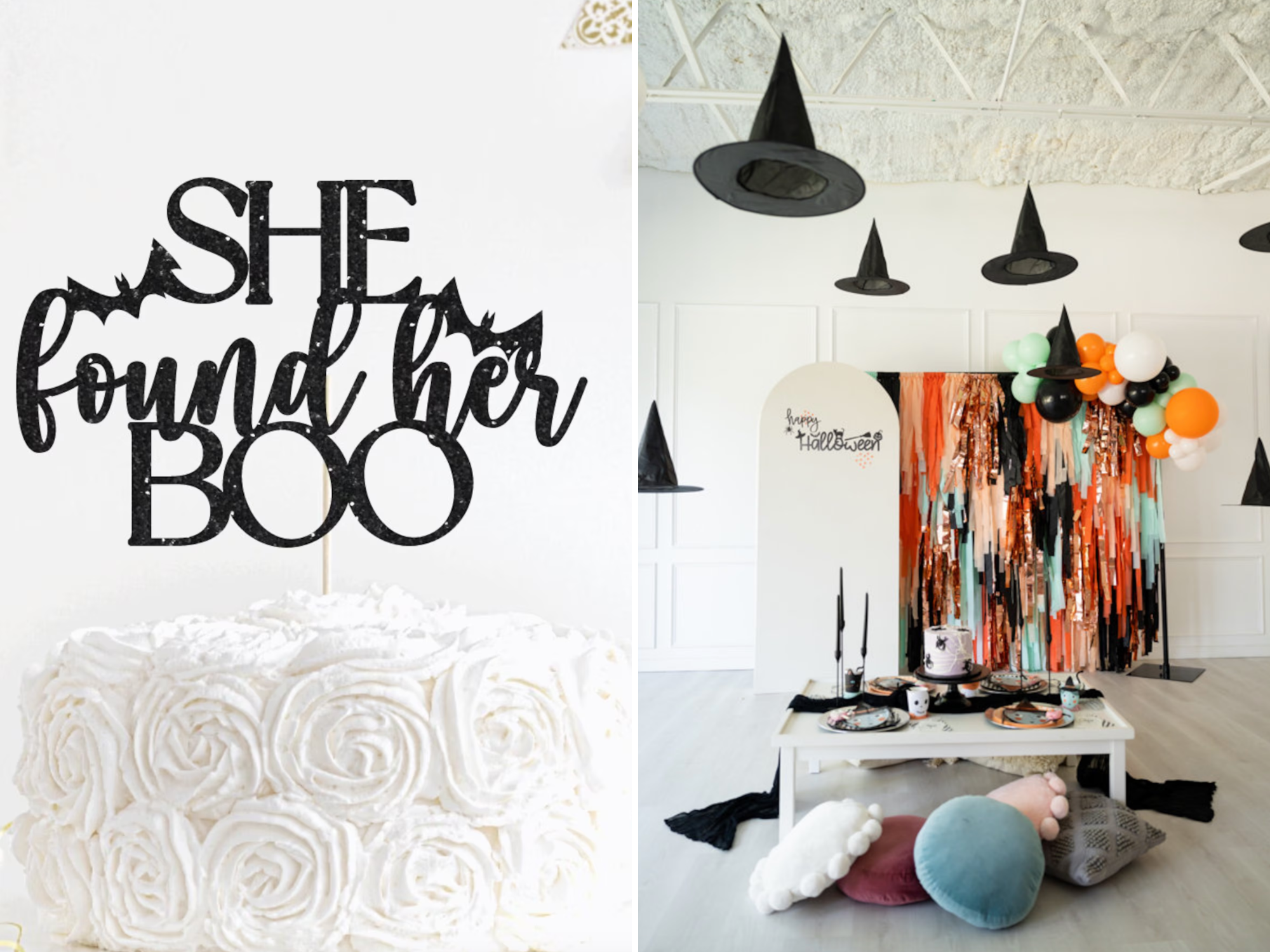A List of Who Pays for the Bridal Shower and How to Split Costs
The beloved bridal shower is a time-honored tradition intended to gift the couple with goods for their newlywed home and lifestyle. But traditions evolve, so nowadays, you might be wondering who pays for the bridal shower—and who's responsible for hosting it? We're here to break it all down for you with advice from Elaine Swann, etiquette expert and founder of The Swann School of Protocol, and New York-based wedding planner Jason Mitchell Kahn. They're sharing their expert tips about exactly who pays for the wedding shower, how much a bridal shower typically costs and how to navigate other bridal shower budget scenarios that may arise. Once you've finalized your budget and decided who's hosting, you can start looking for bridal shower venue options on The Knot Vendor Marketplace.
In this article:
- Who Pays for the Bridal Shower?
- Who Throws the Bridal Shower?
- Average Cost of a Bridal Shower
- What Is a Reasonable Budget for a Bridal Shower?
Who Pays for the Bridal Shower?
In short, the host is the one who pays for the bridal shower—or at least some of it. Most commonly, this is the maid of honor, but the couple's relatives, friends or even the to-be-weds themselves can all pitch in to cover the cost of the wedding shower.
"In that situation, my recommendation for cutting back on conflict is to put one person in charge of collecting the money and then designating that person or another person to make the purchases," says Swann, who is a nationally recognized expert on social etiquette and lifestyle practices. "That way, there's a very clear line of communication in terms of who is contributing what. Just be sure to clearly outline how much you're expecting from everyone involved so there's no confusion or hurt feelings down the line."
Keep in mind that the bridal shower cost is an added expense that might not be feasible for some people, especially for anyone who's also in the wedding party or contributing financially toward the actual wedding. If people aren't able to contribute financially, it doesn't mean that they aren't interested in helping organize the party in other ways. "There are plenty of other non-financial ways to contribute, including sending out invitations, setting up the food, decorating the space and cleaning up," says Swann.
Does the maid of honor pay for the bridal shower?
It's usually the maid of honor's duty to spearhead the bridal shower planning, but they are not expected to pay for the entire party. The MOH can approach the bride's mom, aunt(s), relatives and wedding party members to get the ball rolling. If you're the maid of honor, start by sharing what you're able to financially contribute (beyond buying a bridal shower gift) and crowdsource from the rest of the group. This will help you establish a starting point for your budget and determine whether the shower will be a simple tea party at home or a more elaborate event at a venue.
Does the mother of the bride pay for the bridal shower?
In most cases, it's the mother of the bride's duty to help plan and pay for the bridal shower. Similar to the wedding budget, the to-be-weds' parents should expect to contribute financially if they want a say in the bridal shower details, like the guest list and venue. The mother of the bride can also split the cost of the bridal shower with other relatives, like aunts, grandmothers and future in-laws.
Do bridesmaids pay for the bridal shower?
Similar to the bachelorette party expenses, bridesmaids will probably be asked to pay for some of the bridal shower, although it all depends on the type of party and who's hosting. Most of the bill will be paid for by the host, but bridesmaids could be asked to contribute to the smaller expenses, like bridal shower decorations, favors or surprises for the bride-to-be.
Does the couple pay for the bridal shower?
Depending on their preference, the couple may choose to plan and pay for the bridal shower themselves. This is a popular decision for couple's showers, which involve both to-be-weds (instead of just a bride) and a larger group of guests.
Who Throws the Bridal Shower?
The bridal shower is usually hosted by someone in the wedding party, along with help from the bride's relatives (like a mom, sister or aunt) and friends. Bridal showers are an old tradition that was originally started by neighbors and friends, with the purpose of helping a bride's family assemble a sufficient dowry. Obviously, a lot has changed in modern times, and so has the bridal shower etiquette. These days, who plans the bridal shower is much more open-ended, although it still tends to be a collaborative effort among loved ones.
"Typically, the bridal shower is hosted by the mother of the bride, the maid of honor or the matron of honor," Swann says. "Alternatively, the bridal party may come together to host the bridal shower for their friend. There's also the possibility of another close family member or friend hosting the shower (think: a stepmom, an aunt or a mentor). One more practical consideration for the shower hosting duty is location—especially with loved ones in multiple regions."
Here's a quick rundown of who plans the bridal shower, but keep in mind that it's different for every couple—and these days, you should do whatever works best for your own relationship.
Maid of Honor or Wedding Party
If the wedding party includes a maid of honor, she's usually the one to kickstart the conversation about planning the bridal shower (including how much the bridal shower costs). The maid of honor should initiate the process by first checking with the bride or couple to see what their preferences are. Next, they should reach out to the bride's mother or close family to understand those expectations, followed by the wedding party members.
Family Members
If multiple people want to be involved in hosting the bridal shower, you can delegate the responsibilities among a group of family members and close relatives. Put one person in charge of food and refreshments, one person in charge of activities and bridal shower games, and one person in charge of the decorations—or however you see fit.
According to Kahn, "I find the rules grow less relevant every year. In fact, couples may even pay for the shower if they are in a position to do so and their families/wedding party are not," he says. "More commonly, it is covered by the family—the wedding party might pitch in with odds or ends. In terms of the family, it's not necessarily the parents of the couple getting married. Showers are often thrown by aunts and uncles, godparents, or close friends or neighbors that feel like family."
Other Friends or Acquaintances
Most couples only have one wedding shower, but for others, their coworkers and other acquaintances might want to get in on the celebration too (even if they're not invited to the wedding). If you're planning a bridal shower for a coworker, the party itself can be much more casual and the bridal shower cost is generally much lower. Giving a group gift, planning a team lunch or after-work drinks are good options for keeping it simple and affordable.
Average Cost of a Bridal Shower
"The cost range varies greatly based on the cost of living where you are throwing the shower," says Kahn. "A good rule of thumb is to think about how much it costs in your area for a nice brunch, plus some extras. You'll need to factor in food, drink, service and tax per person. In New York, I would approximate $75 to $100 per head for this. Shower invitations can be as little as $1 per invite for something really basic and can go upwards of $30 per unit for something really custom. I would then estimate another $20 to $50 per person for what you'll spend to enhance the experience with decor and added activities."
If you have the means for it, hiring a bridal shower planner brings several advantages. "They typically know the good spots in town that are well-suited for an event like this and can streamline the planning process," says Kahn. "Showers can grow in scale—to the size of a small wedding—and if knowing that overwhelms you, a professional might save you a lot of stress."
Stressing about how much a bridal shower costs? Kahn suggests, "If learning what this could cost intimidates you, try to find a venue that's relatively turn-key and won't require much additional decor. You can save money with invitations by doing them online. Showers are meant to be a time for fun and celebration, so focus on how to make that happen rather than having the best of everything."
What Is a Reasonable Budget for a Bridal Shower?
Very much like the wedding itself, the average cost of a bridal shower varies widely depending on the venue, guest count, and food and drinks being served. It's also important to make sure that your bridal shower budget includes taxes and tips for any professional vendors you hire.
On the upper end of the scale, we recommend budgeting $125 per person for an event at a venue. This would cover more elaborate bridal shower ideas, like paper invitations, a brunch or luncheon, one or two drinks, cake, floral centerpieces, games and prizes. At the lower end of the scale, we recommend budgeting $40 per person for an at-home event with light refreshments provided by a caterer. This would also cover invitations, wine or bubbly, simple decorations, games and prizes.
You can minimize the cost of the bridal shower even further if the hosts can all pitch in and contribute their time to DIY most of it. Homemade nibbles and a glass or two of wine are perfectly acceptable. Remember, the purpose of the event is to shower the couple with gifts before the big day, so you don't need to get carried away with too many bells and whistles.
Samantha Iacia contributed to the reporting of this article.
























